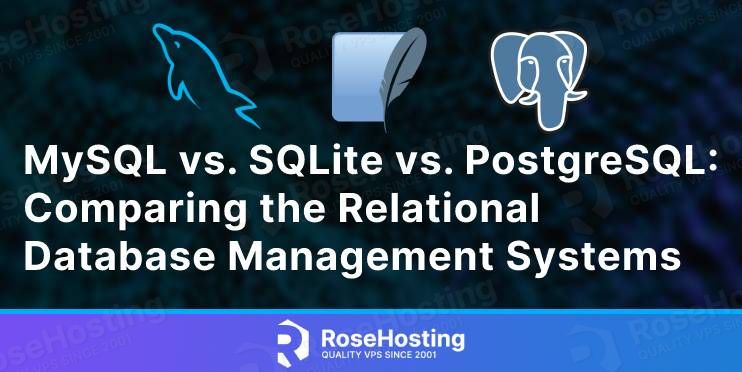In this tutorial, we are going to explain the differences between relational database management systems such as MySQL, SQLite, and PostgreSQL.
This type of relational database management system is used worldwide, based on relational models, where the information is stored in tables linked between with relations, making the data to be easily referenced. We will explain the advantages and disadvantages of every type in a couple of sentences so you can better understand which one you should use in different scenarios. Let’s get started!
Table of Contents
1. MySQL
MySQL as a relational management database system is the most popular since, the first database rankings around 10 years ago. MySQL has a huge number of developers and very good documentation which is very helpful for the new users that number is increasing on daily basis. Database types offered by MySQL are tinyint, smallint, mediumint, int, bigint, float, double, datetime, char, and many more, which can be viewed on the official documentation of MySQL in three categories: numeric types, date types, and string types.
The main purpose of the developers was to make MySQL a fast and reliable database management system. MySQL is open-source, written in C and C++, and is developed and maintained by the Oracle Corporation.
MySQL Advantages
Speed: As we said in the previous paragraph, the main purpose of the MySQL developers was to work on the speed, we can confirm that the fastest database management system at the moment is MySQL.
Security: The second advantage which is very important is security. MySQL offers a script called mysql_secure_installation which can be set the password of the root user, removed the anonymous user, test databases and etc.
Replication: The third advantage is the replication that MySQL offers. We can replicate master to slave and master to master. This is due to better reliability, accessibility, availability, and 100% uptime of the database service. You won’t face downtime of your website with this setup.
With the above advantages, the MySQL database system is very popular, easy to install, and easy to use.
MySQL Disadvantages
Compared to the advantages of MySQL, the disadvantages are very rare and are related to some limits, sometimes with stability and scaling. Also, MySQL queries are limited, and they should be smaller. The other disadvantage is that MySQL has slow concurrent read-writes.
2. SQLite
SQLite is an open-source relational management database system written in C and the most used database engine by the operating systems, embedded systems, web browsers and etc. Unlike other relational database management systems that are implemented as s server processes, SQLite is a “serverless” database and allows any process to read and write to the database disk directly. This additionally tells us that the SQLite is running directly and there is no need for installation and setup at all. Database types offered by SQLite are null, integer, real, text, blob, datetime and etc. SQLite is maintained by a group of developers.
SQLite Advantages
Small Size: SQLite does not require too much space or dependencies before its installation. SQLite only requires around 650KB of disk space and has a small footprint.
Caching: SQLite can cache data from the server locally and reduce the latency for queries. Also, SQLite can keep the application alive so it can not face any downtime.
Portability: SQLite stores the data into a single file that can be located anywhere on the server, and can be transferred very easily from one to another server, or device.
User Friendly: SQLite is running without a server process, so you do not need to start, stop or restart the service.
SQLite Disadvantages
The disadvantages of SQLite are related to the users, limitations with the changes in the database, and sometimes with the security. This means that there are no users, with permissions to the database and only one process can write into the database. SQLite is not supporting replication instead of MySQL and PostgreSQL.
3. PostgreSQL
PostgreSQL or better Postgres, is an open-source relational database management system written in C and C++. It is a highly compliant and extensible database, and the most advanced compared with MySQL or SQLite database systems. PostgreSQL can handle multiple tasks at the same time without reading locks which ensures isolation and consistency of its transactions. Database types offered by PostgreSQL are bigint, integer, real, date, interval, and many more sorted as Numeric Types, Character Types, Date and Time Types, Geometric Types, Network address types and etc, viewable at the PostgreSQL official documentation. PostgreSQL is less used than MySQL or SQLite and is maintained by the PostgreSQL Global Development Group.
PostgreSQL Advantages
Extensibility: PostgreSQL is extensible because its operation is catalog-driven. PostgreSQL stores much more information in its catalogs, unlike MySQL or SQLite. These catalogs (columns, tables, databases and etc.) can be modified very easily by the user.
Speed: Compared to other relational database management systems PostgreSQL is the fastest database for processing long queries which allows us to insert millions of records in a couple of seconds.
Community Driven and Open-Source: PostgreSQL is fully developed by a large community of developers who are also responsible for the PostgreSQL official documentation and various blogs and forums over the Internet.
PostgreSQL Disadvantages
The main disadvantage of PostgreSQL is its memory performance that is increasing after a new client connection. Each new process allocation can spend around 10MB of the available RAM memory. Another disadvantage is that PostgreSQL is not very popular as MySQL and there are not many database administrators compared with MySQL database administrators.
That’s it. This tutorial explained the relational database management systems such as MySQL, SQLite, and PostgreSQL. If you want this article useful, and you want to use some of these database management systems, you can sign up for one of our managed NVMe plans and our admins will do the rest. We are available 24/7.
If you liked this comparison of MySQL, SQLite, and PostgreSQL, please share it with your friends on social networks or simply leave a reply below. Thanks.
